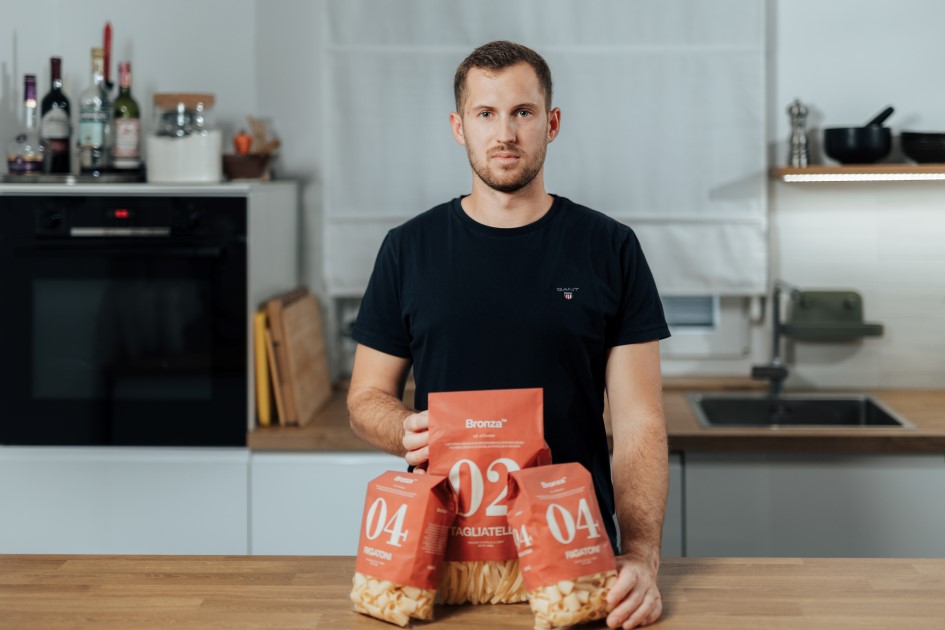RIT Croatia Alumnus Rudi Oškera: Crafting Culinary Perfection with Bronze-Molded Pasta
In the world of gastronomy, innovation often takes a back seat to tradition, but Rudi Oškera, a 2022 graduate of RIT Croatia's International Business program, is reshaping the culinary landscape with a passion for pasta like no other. Story behind Oškera's brand Bronza Pasta is one of ambition, creativity, and a deep appreciation for artisanal craftsmanship. Having harnessed the knowledge and skills he acquired during his time at RIT Croatia, he has embarked on a remarkable journey to create the finest pasta, using a unique and centuries-old technique: bronze molding. In this article, we delve into the extraordinary journey of Rudi Oškera, a young entrepreneur with a taste for excellence, as he elevates the pasta industry to new heights through his meticulous and innovative approach.
Entrepreneurship and Career Journey
Q: Can you tell us about your path from studying in the IB program at RIT Croatia to starting your own pasta production business? What motivated you to venture into this field?
Rudi Oškera: Like many of my fellow RIT Croatia students, I believe we all begin our journey with grand aspirations and evolve through various phases during our four-year program. Some arrive with a clearer sense of their destination, while others are still exploring their path. However, we are exposed to a multitude of experiences that contribute to our personal growth and help us discover our true passions and professional aspirations. RIT Croatia provides its students with many resources on hand, and for me, co-ops have been the most profound. I've always been a bit of a dreamer, often lost in my thoughts, but I knew that I found great joy in the act of creation. One thing led to another, and I found myself drawn to the world of the food industry. I held a conviction that I could establish a meaningful business, and I felt compelled to take that chance.
Q: What were some of the most important skills or lessons you gained from the IB program that have helped you in your entrepreneurial journey?
Rudi Oškera: Throughout the program, I came across a ton of Excel spreadsheets, which turned out to be incredibly helpful, especially if you're into finance. However, the most significant takeaway for me was the encouragement to think critically and the boost in confidence that came with it. Because when everything is on you, you need to be able to think critically and make some decisions fast and right. This also takes a lot of work on the personal side. And I know for a fact that I came a long way during the program. I have also realized that gaining an international perspective on launching a business is a valuable aspect of RIT's education.
Q: Could you describe the process of transitioning from being a student to becoming an entrepreneur? What were some of the challenges you faced, and how did you overcome them?
Rudi Oškera: Describing this journey isn't all that straightforward (laughing), simply because there are a lot of unexpected challenges and situations that arise when you're trying to build a company. You need to brace yourself for some extended tough times to keep your efforts going despite little or no tangible outcomes. Having finished business school was undoubtedly helpful by giving me some solid ground for further learning and providing me with the perspective I wouldn’t otherwise have. There are moments when things can get really tough, and you find yourself in a spot where you have to brainstorm solutions out of nowhere. These are the times when you rely heavily on creative and critical thinking. In each of those situations, there's always some action you can take.
Pasta Production and Industry Insights
Q: Your pasta production uses bronze molds. Can you explain the significance of using bronze molds in pasta production and how it differentiates your products from others in the market?
Rudi Oškera: Absolutely. My passion for cooking laid the foundation for this journey. I was determined to get to the essence of creating the finest product possible. Bronze dies play a fundamental role in this process, as they provide the pasta with more friction during extrusion, resulting in a rougher surface texture. Pasta made with bronze dies maintains a more natural appearance and color. When paired with high-quality semolina, the result is truly beautiful pasta. We also don’t add any eggs as they simply aren't necessary to achieve the best quality, just as it's done in Italy.
Q: What made you choose the food industry, specifically pasta production, for your entrepreneurial venture? Were there any specific trends or gaps in the market that you identified?
Rudi Oškera: I've always been drawn to production, given my upbringing in a family with over 30 years of experience in the business. Combined with my lifelong love for cooking, it naturally led me to the world of pasta production. Pasta, as a product, is typically seen as a straightforward commodity which in a business sense it definitely is. However, I believe there's room for adding a personal touch and genuine care to the process. In the market, you often encounter either pricey, small Italian brands or a sea of similar products with different packaging. Our mission is to provide artisanal pasta that's accessible to everyone.
Lessons and Advice for Aspiring Entrepreneurs
Q: In hindsight, is there anything you wish you had known before starting your own business? Any advice you would give to someone considering entrepreneurship, especially in the food sector?
Rudi Oškera: I always say when I talk to people, I even think that you need to be a little bit naive and overly enthusiastic when starting a food business. Perhaps if you were aware of every struggle, you just wouldn’t do it. This of course is not to undervalue preparation and risk management, entrepreneurship is not gambling. I would say that you visualize as much as you can and know your “unfair” advantages compared to the market. And one more, become obsessed with expenses, they’re trying to kill you J
Q: Building a network is often crucial for business success. How did your time at RIT Croatia and its IB program contribute to your network and support system as an entrepreneur?
Rudi Oškera: Opportunities are all around at RIT Croatia, and looking back, that time during the program was incredibly precious. I believe we all tend to underestimate it a bit. RIT Croatia is a place where, if you're open to it, you can build meaningful friendships and partnerships. I can honestly say that I'm much richer today for the wonderful people I met during my college days and am still in touch with.
Q: Sustainability is an important concern in today's world. How do you address sustainability in your pasta production process, and how has it impacted your business decisions?
Rudi Oškera: I like the quote “What you do in small scale and everyday life, you’ll do on a big scale”. We are still quite small, and our impact is limited, but thinking about those things today will impact how our future will look. I generally try to have a long-term perspective on everything and make decisions as if this will last for hundreds of years. Keeping this perspective helps with decision-making and staying away from short-term gain and paying for it later kind of taught.
Q: Entrepreneurship often involves continuous learning and personal growth. How have you evolved as a person since starting your own business, and what have been some of the most valuable lessons you've learned along the way?
Rudi Oškera: Taking on more significant responsibilities has made me more grounded and realistic about life. It's something you learn when you're the only one to blame. Plus, I've come to terms with my impatience. I've realized that the best and most rewarding things in life often require a lot of time, so I've been working on being more patient.







